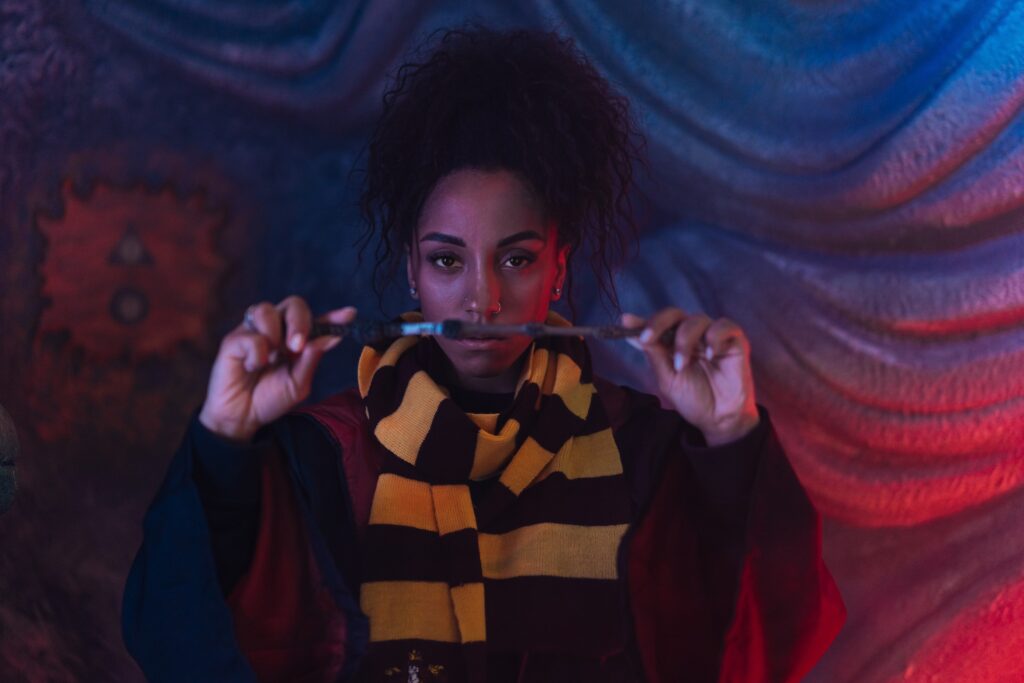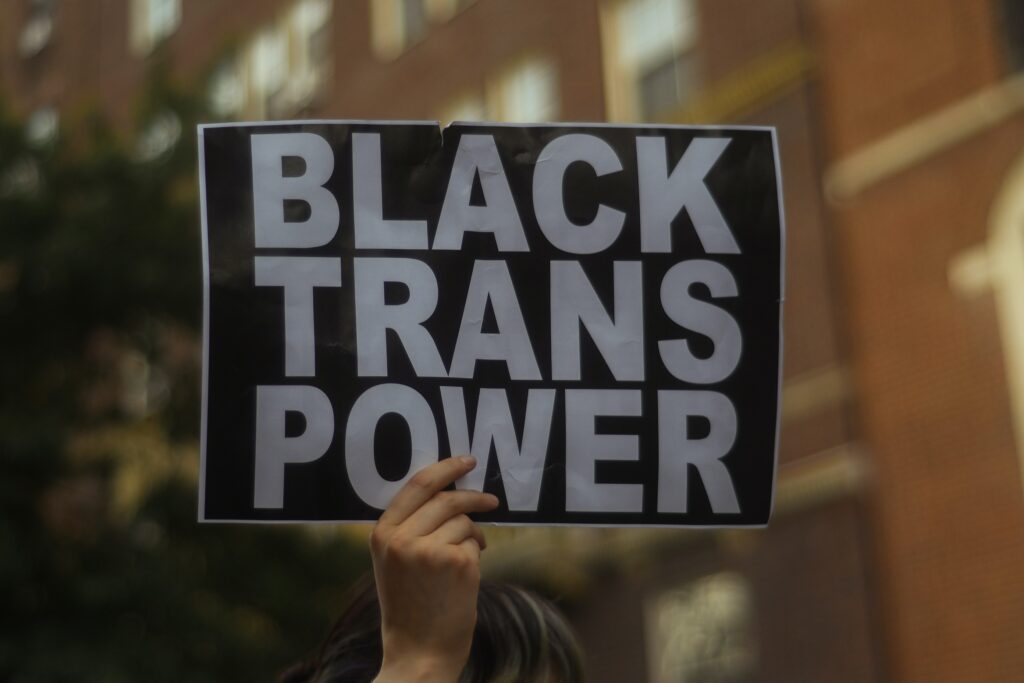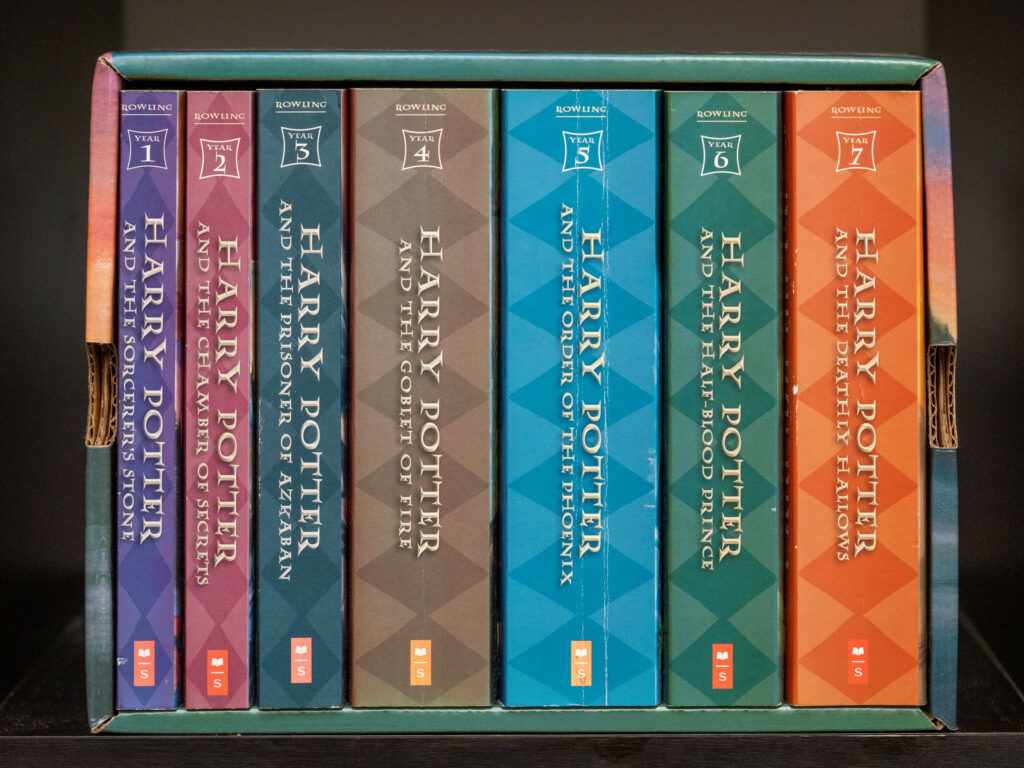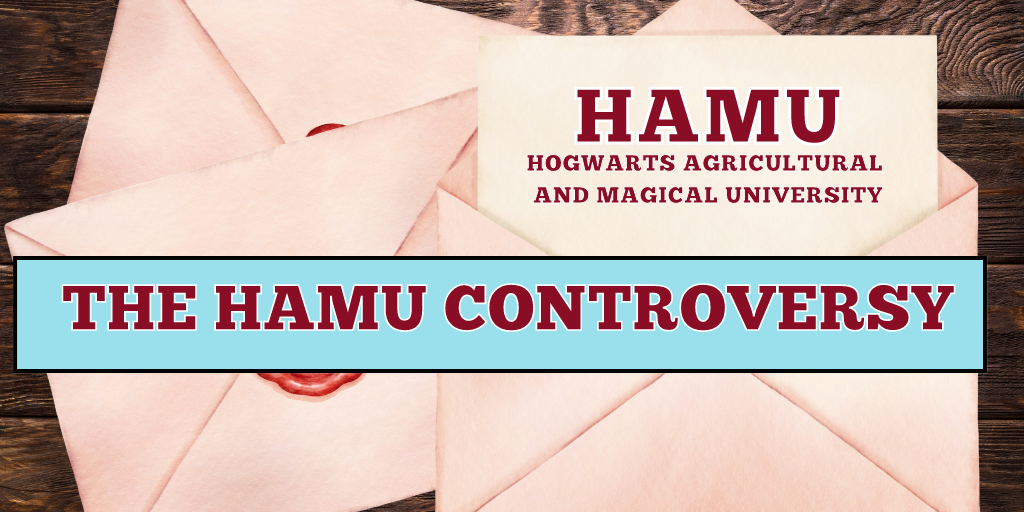If you’ve been on TikTok, you’ve seen the Black Hogwarts videos—the ones in which Black Harry Potter fans use pictures of common rooms and Quidditch pitches and incorporate HBCU trappings like “strolling” or HBCU dance teams.
This genre of TikTok is now called “HAMU” by its fans, aka “Hogwarts Agricultural and Magical University.” The name pays homage to America’s HBCUs–Historically Black Colleges and Universities–and by extension, places Harry Potter and its new game, Hogwarts Legacy, squarely in Black culture.
I will be the first to admit that doing this is clever and, if it weren’t for extenuating circumstances regarding JK Rowling, it would be entertaining. Seeing Black Harry Potter fans appropriate a magical English boarding school into a historically Black college should be amusing and, for some fans, it’s an affirmation of their experience as Black nerds (“blerds”) who might have felt marginalized growing up because of their nerdiness. Some also see the trend as a form of rebellion against Rowling and the transphobia and racism she’s given a platform to. As one commenter on a TikTok video wrote, according to Buzzfeed, “It works because you know she would hate it.” That may be true, and besides, the HAMU stuff is all in good fun.
But when does “good fun” become hurtful or even harmful to others? That’s what I and others have been trying to figure out. The sticking point revolves around the controversial creator of Harry Potter, J.K. Rowling. As many people close to the fandom already know, Rowling has more than ruined her reputation by doubling down on transphobic rhetoric. Her work has also been dissected for its racist tropes, including Jewish and Asian stereotypes. This has made the release of video game a lightning rod for discussions regarding separating the art from the artist.
If it were the mid-2010s or earlier, I might have thought this HAMU trend to be ingenious. I would have loved nothing more than to rep Slytherin House as a bonafide, Pottermore-official member. But we are not in those times, because in those times, Rowling hadn’t outed herself as a raging transphobe, not to mention her other racial horrors. And this fact, plus the fact that trans people have been pleading with cisgender folks to boycott Rowling and the new game have made the current trend very uncomfortable for me to witness. At this point, the trend is now just cringe.
Black people move the needle in culture, including Harry Potter

The biggest issue with the HAMU trend is that it is only making Harry Potter–and therefore JK Rowling–more relevant and where there’s more relevance, there’s more money in Rowling’s pocket.
The running argument when it comes to the critique of not giving into the temptation to play Hogwarts Legacy is, “We’re not supporting JK Rowling–she didn’t get paid by Warner Bros. when they made the video game!” First of all, how naïve. Second of all, of course Rowling got paid when its Rowling’s idea Warner Bros. keeps trying to keep alive. You can’t tell me that Warner Bros. isn’t contractually obligated to pay Rowling a set royalty rate. That’s how business is done. Why else do you think people had a boycott to stop people from playing R. Kelly’s music? It was to to stop R. Kelly from getting royalties from Spotify!
Therefore, it’s imperative to stop and think a little bit when it comes to the impact the Harry Potter HBCU trend has on the sales of Hogwarts Legacy. We already know how impactful Black trendmakers and trendsetters are.
McKinsey & Company cites Black consumerism as a “$300 billion opportunity” for companies to cash in on. The article rightly calls out how Black consumers are largely underserved by the overall market when it comes to essentials, such as banking, healthcare, access to broadband cable, food, housing and more. Black households also accounted for “just under 10 percent of the nation’s total spending on goods and services in 2019” despite being 13.4 percent of the American population. Yet, the Black dollar goes on to fund capitalism because of our increased spending.
“Beneath these sobering realities, however, is a market with substantial buying power and influence–and plenty of upside for the future. In 2019, consumer expenditures by Black households totaled approximately $835 billion. Combined spending by all Black households has increased 5 percent annually over the past two decades. It has outpaced the growth rate of combined spending by White households (3 percent), driven mostly by faster population growth.”
Black consumers are also more tapped into their phones and online culture, partly because the median age of Black Americans is 34, “a decade younger than the median age for White Americans.” As a more digital culture, Black Americans are “nearly three times more likely than white Americans to expect the brands they use to align with their values and support social causes.” They are also more likely to own a smartphone and 12 percent more likely use their phones more than White Americans.
The article suggests that if companies wanted to tap in to the $300 billion opportunity to make money within the Black community, it would be wise to cater to them and their specific needs. You could argue that Black Harry Potter fans are doing the hard work for Warner Bros. and forcing Hogwarts Legacy to align with them by co-opting it into an African-American framework.
Black women specifically move society to buy or not buy. According to Nielsen in 2017, Black women :make up 52% of the Black population and control the lion’s share of African-Americans’ $1.2 trillion in annual buying power. In fact. the increase in total Black buying power can be traced in part to the increase in educational attainment and entrepreneurship of Black women.”
“Black women will only continue to grow in importance as the overall population continues to become more diverse,” Nielsen continues. “…Black women are the leaders, originators and trendsetters in the bitingly witty and culturally influential community known as Black Twitter.” The article cites movements such as #BlackGirlMagic as one example. Another example I’ve covered on this site is April Reign’s #OscarsSoWhite.
In a 2021 report, Nielsen again proclaimed Black Americans as the leaders of cultural conversation.
“As Black Americans continue to video stream, listen to radio and podcasts, as well as buy Black, they continue to lead the conversation and stay connected through social media — having an unprecedented impact on brands and what consumers watch, purchase, and listen to,” states the organization, with Nielsen’s VP, Diverse Insights & Partnerships, Charlene Polite Corley, adding, “As the media industry looks to be more inclusive of Black storytellers and brands look to grow their bottom lines and brand awareness with Black audiences, understanding who we are, where we’re connected, and how we’re changing is as important as ever. All of this work translates to the important acknowledgment of the value the Black community delivers ‘for the culture’ and beyond.”
With these stats in play, it stands to reason that Warner Bros. would be the biggest benefactor from the Harry Potter HBCU trend. Warner Bros. could easily leverage the excitement and turn it into profit, and to be honest, they wouldn’t even have to do much–the TikTokers are doing it for them.
Already, people on social media are seeing the hype and getting the hankering to read (aka buy) Harry Potter books.
Hbcu hogwarts tiktok got me interested in Harry Potter quicker than the fuckin book fairs and all that bs did back in elementary school 😭
— Traffic Jam Booty (@mocha_hunty) February 28, 2023
All this Hogwarts HBCU stuff on TikTok is making me want to spend my whole Spring Break reading the Harry Potter series 😭. Because am I really a Hufflepuff?
— ✨👩🏽⚖️⚖️✨ (@Nya_Elyse) February 27, 2023
And with buying the books comes buying the merch. And with the merch and book sales comes more money for Warner Bros., which also means more money for JK Rowling.
Listen to and acknowledge trans people’s feelings

Part of what annoys me about the trend is that ultimately, this could become something the fans will lose their rights to. We’ve seen before how Black online creators are often left out of the success of their own work, with corporations or even other TikTokers claiming the idea and capitalizing from it until it is divorced from the original source. This is what could happen to the HAMU trend tenfold. Warner Bros. is certainly watching the growing hype around the trend, and they are watching how it affects their bottom dollar as well. But if the trend gets too big and Warner Bros. feels they’re at risk for losing profit from it, then they’ll shut it down. And then the fans will be left with nothing.
So with that being a real possibility, I have to ask what is the point of sticking with it, especially since the joy could seem callous in the face of those who have asked us to stop ingesting Harry Potter content–the trans community.
I know a lot of fans of the HBCU trend have spoken at length about how they feel they aren’t supporting a transphobe by supporting the trend. But since Rowling is so tightly entrenched in her own creation, the HBCU trend is, unfortunately, supporting her by proxy. Hear me–I’m not saying that everyone who has participated in the trend are transphobes. I’m not saying folks participating in this are bad. What I’m saying is that if we Black consumers are the lifeblood of corporations’ successes and failures, then we have an immense level of power that sometimes I feel we aren’t even aware of. So often, we are mined for our talents to the point that we become used to it. But we also have the power to withhold our talents and use them on something more worthwhile than propping up a franchise that has a transphobe and racist at its center.
Before anyone starts, I already know a response to this–there is no ethical consumption under capitalism. If we’re supporting Disney, are we also supporting Walt Disney’s racism? If we support Starbucks, aren’t we also supporting their poor treatment of workers? The list goes on and on, and very quickly you can find a whole host of companies and individuals that we unfortunately support through our dollar. But whereas something like Disney or Wal-Mart has become so looming that you can’t escape its clutches, Harry Potter is a much smaller and more direct issue.
The Harry Potter issue is one-to-one: Rowling is virtually synonymous with Harry Potter, and supporting one leaves little room for the discussion of how to not support the other. The only way to avoid the discussion is to leave Harry Potter alone altogether. It’s not like Warner Bros. would hurt for long if it had to give up Harry Potter. The person who would hurt the most financially is Rowling, and this is what lies at the (hor)crux of this debate. People want others to withdraw their support from Rowling and Rowling alone because of her statements and actions. And it could be as easy as simply not buying and playing the freaking game, as a start.
USA Today interviewed trans people who were once fans of Harry Potter and Rowling in a 2020 article. One person, award-winning author Kacen Callender, called Harry Potter a lifeline for them, using the books as a way to stay buoyed in bad situations in their lives. They also alluded that their love of Harry Potter inspired them to become an author, with their most recognizable book, Felix Ever After, revolves around Felix, a Black trans character. But now things are different.
“I’m scared to think about the people who might have loved Harry Potter and thought about it the same way and then to see their idol come out and say that they’re not worthy…I do think that giving her any sort of platform is potentially life-threatening and dangerous…Her rhetoric continues to push this incorrect thought and conversation around transgender people.”
If it still doesn’t make sense to you, let’s talk about this discussion in relation to another project, the West End production of The Unfriend, starring Amanda Abbington and Frances Barber, who have both written anti-trans rhetoric. While Abbington has apologized, Barber has doubled down, similar to Rowling. Something that makes it worse is that the production is directed by Mark Gatiss, who himself is a gay man (and someone you would think would be more sensitive to LGBTQ+ rhetoric). (For full transparency, the production is also written by Gatiss’ frequent collaborative partner Stephen Moffatt, who has been problematic in his portrayals of women in his works, including Doctor Who, which Barber has starred in, and Sherlock, which Abbington has starred in.)
YouTube theater critic MickeyJoTheatre and friend and fellow critic EllieTalksTheater talked about The Unfriend controversy on MickeyJo’s YouTube channel. Ellie, who is trans, spoke specifically about the constant argument of separating the art from the artist and how it can’t be possible when it comes to works like The Unfriend or Harry Potter, in which the artist is squarely interacting in real-time with the art.
“I think it is easier to separate the art from the artist if you’re not the one being target,” she said. “I would love to see Cursed Child [the West End production of Harry Potter and Cursed Child]. I would love to be able to go see The Unfriend. But…if I went to see it and I was sitting there and I was watching this production, on my mind the entire time would be these comments, would be what these people stand for.”
“I would love to be able to say, “Okay, I can love Harry Potter, but I just don’t love JK Rowling,” but everything that is on stage, everything that is being reflected, all of this has been soured so much because of that,” she continued. “We associate, no matter how much we want to, we associate Harry Potter with JK Rowling…The hurt that comes from something like Harry Potter and something like JK Rowling’s comments, can’t separate that.”
MickeyJo also said something extremely important: “If someone were openly racist, perhaps, or openly intolerant in some other way that society has now adapted to entirely understand is not appropriate, is not permissible, that wouldn’t be condoned, I don’t think, in the same way.”
The reason why it seems easy to support HAMU and disavow Rowling in the same breath is because it’s still all too easy to disavow trans life in general. As a society, we haven’t come to a place where we will unequivocally stand with the trans community and punish others who don’t. If Rowling had said something specifically harmful about Black people, no Black people would be trying to separate the art from the artist. However, because Rowling has spoken against trans people, a group that too many of still have too little education about or empathy for, it’s easy for some to believe that they can separate Rowling from her creation.
In a similar vein, it’s easy for fans to not think too deeply about Rowling’s alleged antisemitism in the form of the goblins, who represent stereotypes of greed and thievery. A large number of Rowling’s Jewish fans felt offended by the goblins, who run the Gringotts Bank in the Wizarding World and are associated with all things wizard money. In Hogwarts Legacy, the main villain of the game is a goblin that very clearly is interested in committing blood libel, yet another antisemitic trope.
According to Hey Alma, the controversy around the goblins spans all the way back to the Middle Ages:
“As laid out by Debra Higgs Strickland in “Saracens, Demons, and Jews: Making Monsters in Medieval Art,” by the 12th century, the stereotypical Jewish “look” was established,” according to the site. “In primarily woodcuts and drawings, Jews were often portrayed as having an oversized and crooked nose and either appeared to be demon-like or consorting with the devil himself. This was done with the aim of making Jews easily identifiable as well as seeming as ugly, grotesque, subhuman and evil so Christians would not want to associate with them.”
The site, like many others, have stated that Rowling herself might not be aware of how goblins, which are creatures that have been around in folklore for centuries, could be used in an antisemitic context. But, the site continues, that the goblins are still, whether consciously or unconsciously, used as antisemitic tropes.
“Looking towards the most prominent example of this, the Gringotts goblins from Harry Potter are very clearly rooted in antisemitic stereotypes — regardless of whether that was JK Rowling’s intent or not,” the site states. “As literary agent Connor Goldsmith told Hey Alma in 2019, ‘“’Rowling’s goblins are nakedly anti-Semitic caricatures — a race of gnarled, hook-nosed misers obsessed with gold, who believe they own everything they’ve ever produced and wizards who purchase things only ‘rent’ from them. They appear to run the entire wizarding economy, and trust no one but their own kind. It’s suggested that secret cabals of goblins work to undermine the wizard government.’”
“The new Hogwarts Legacy video game (which, once again, JK Rowling did not play a part in creating) only reinforces the caricature. For players, the main thrust of the game is to help put down a goblin rebellion in 1890, which is being led by a goblin named Ranrok,” the site continues. “According to GameRant, here’s what Ranrok’s goal is: ‘The main scheme of the primary antagonist is to kidnap the player character, and harvest their blood for a spell that will wipe out his enemies while aligned with a number of dark wizards.’ Harvesting the blood of a teenage (essentially, a child) wizard? Sounds a whole lot like blood libel to me.”
With all of this out there, it should be simple to absorb the information and decide to abstain from Harry Potter and its offshoots out of solidarity with other marginalized groups, like Jewish people and trans people of all races. But in a similar way to society not having enough education around trans issues, society still doesn’t have enough education and awareness of antisemitic tropes, thereby making it easy to overlook the issues and try to separate the art from the artist. But for people who are affected by these tropes and by the erasure, it is improbable, if not impossible to accomplish this task.
The call to “consciously uncouple” from Harry Potter

I think it’s important to recognize how Harry Potter is a part of many of our childhoods. A lot of us, including myself, have fond memories of reading the books and becoming immersed in the lore. I wish I could love Harry Potter as much as I once did. But I think it’s also important to separate my lovely memories of magic and wizards from the reality of how the book’s author is actively harming her fans.
It’s only too easy for all of us to try to look over Rowling for the sake of “diversity” and “representation” and “blerd life.” But if we as Black creatives are truly about diversity and representation, then we have to consistently practice intersectionality. Intersectionality includes recognizing that trans people also go to HBCUs and maybe they don’t want to have Harry Potter associated with anything that reminds them of their college experiences. It includes remembering that Black trans people do exist and interact with the Harry Potter discussion just as much as non-trans Black people do. It includes understand that Black trans people also might have fond memories of reading the books but now feel a lot of complicated feelings about seeing other Black fans try to forget what Rowling has said or separate Rowling from Harry Potter.
I don’t think the HAMU fans intentionally mean ill will. But I think it’s also a great example of showing how we all have work to do when it comes to being intentional about our fandom. Being Black isn’t enough to erase the harm Rowling has done. Our Blackness can’t and shouldn’t be used as a shield for her, which is what HAMU could very well be used for by Warner Bros. and Rowling herself. If we are truly about standing up for what’s right, then we have to stick with our Black and non-Black trans friends and truly disavow Rowling. The more we try to piecemeal our activism against Rowling for the sake of Harry Potter, the less impactful it becomes.
